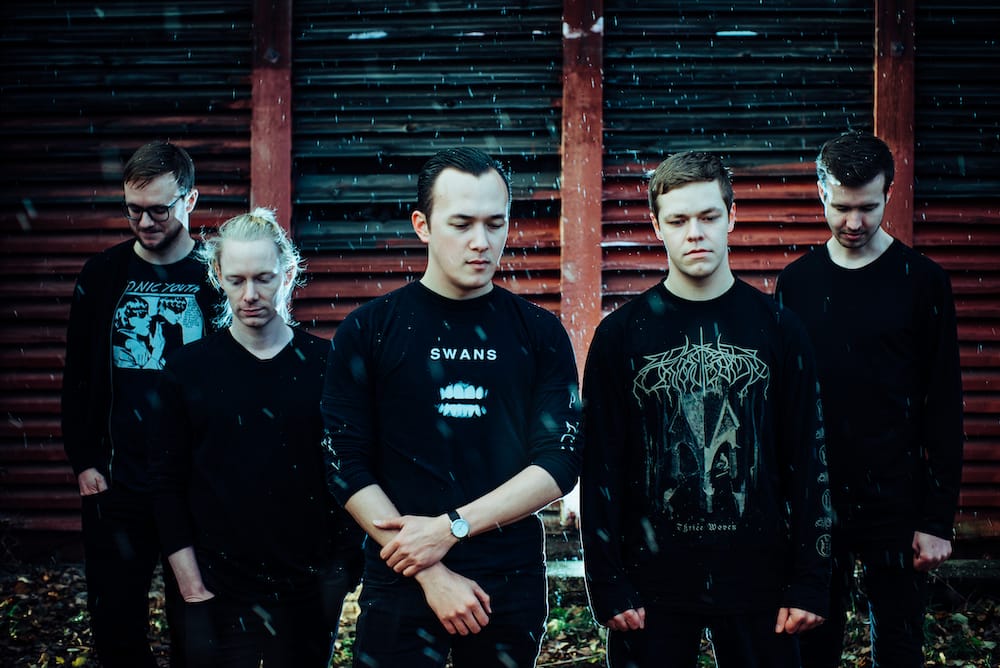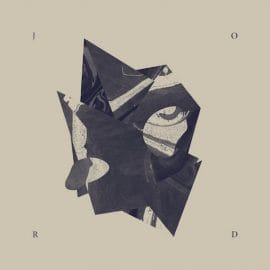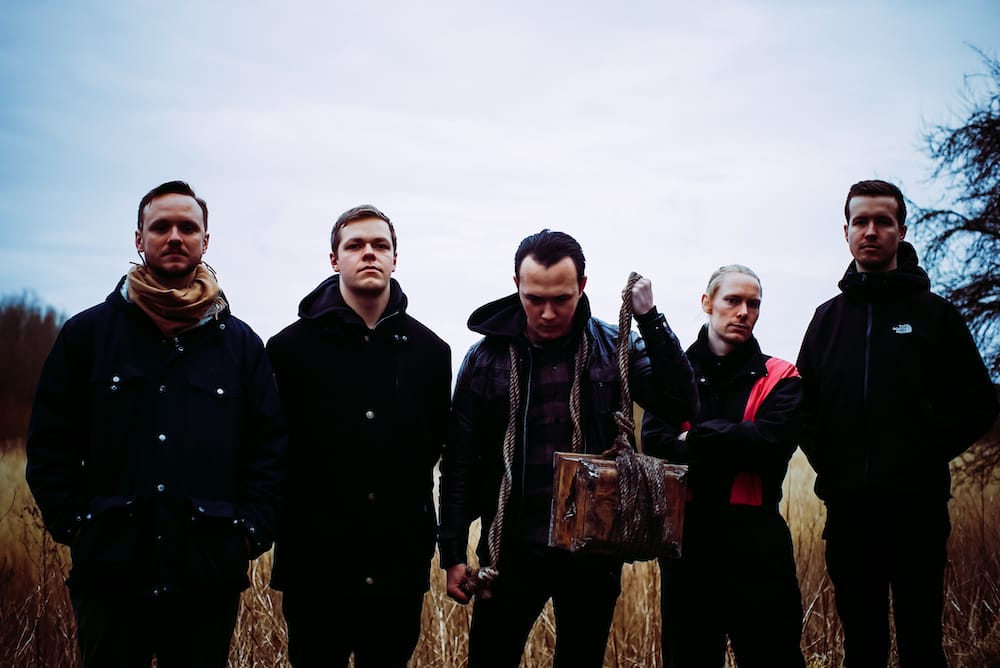For a young band that’s already being acclaimed for their debut album, it’s certainly not easy to deal with the sudden rise in popularity. One tour follows the other and interviews are constantly requested from all sides. Therefore it’s all the more gratifying that the up-and-coming Danish blackgazers MØL eventually found the time to answer some questions about their debut „Jord“, the similarities of their first music video to Sólstafir’s „Fjara“ and the evolution of the black metal genre.

Greetings! Thank you for doing this interview with us. How are you?
Very well, thank you! We just returned from our first show in Finland where we had an amazing time – shoutout to Saari Helvitti! And now we’re preparing for our show at ArcTangent 2019 in UK next week, a show we’re very much looking forward to.
Let’s dive right in and start with something general about the band. What is the meaning behind your bandname MØL?
MØL means „moth“ in Danish. It’s a representation of something ugly and unwanted and yet elegant and beautiful at the same time. We try to find both of those aspects and channel them through our music.
Your style of blackgaze seems to be quite similar to that of Deafheaven. What exactly fascinates you about this type of music?
We draw inspiration from a lot of different artists. We all grew up listening to different genres of music and we try to combine these elements in MØL. Blackgaze can be all that, haunting and grim and at the same time very melodic and beautiful, something that can reach out to a larger crowd than maybe just pure black metal can.

On the other hand, what do you think about traditional black metal?
We still listen to some traditional black metal bands, but the older generation, I think, has a hard time accepting these newer waves of „blackgaze“ or „post-black“ bands that are emerging right now. As mentioned before we draw inspiration from a lot of different bands, so the traditional black metal scene has been important to many of us, but is also new to others. We don’t try to label ourselves as playing black metal, because that was something that was created with an entirely different mindset, so we try to do our own thing, which might take inspiration from some of these artist.
How important is it to you to have distinct, unmistakeable sound as a band?
I think we try to be original when we write music. We don’t set too many rules and we always write music that we, ourselves, like and not to target a specific group of listeners. We’re very grateful that people are listening to us and are accepting the music we play, that means a lot to us.
You already released your first full-length album titled „Jord“. The song titles seem to be rather cryptic. So, what is the album’s lyrical content about?
Well, when you translate it, it’s less cryptic. It can be translated into „earth“, „ground“ or even „soil“. The lyrical content is connected to the images you could create with these words: death, being put into the ground, the idea of impermanence, environmental criticism and reconciling with these ideas as a human being. There are also more personal stories that Kim writes about that connect to these themes.
 The artwork also looks quite abstract. What’s the idea behind it?
The artwork also looks quite abstract. What’s the idea behind it?
The artwork was created by Jon Gotlev of No Heroes. We told him what the themes of the album were and that we wanted a modern interpretation of these themes. And the „Jord“ artwork is what he came up with. We think it’s a interesting interpretation of the music. It has weird geometrical shapes colliding with each other, and they look like they are made from dirt and water. Like our music.
In which way, do you think, have you evolved as a band since your EP „II“?
For short, we got two new members, which in itself has made the band evolve quite a lot. Our expression as a band has changed from something introvert to a more outbursting and „in your face“ expression, but we still very much try to hang on to our roots and remember where it all began.
How would you describe the experience of recording and releasing your first album?
For a lot of us it was an entirely new experience sitting all day in a studio recording a couple of songs that you’ve been working on for a long time. It’s hard work and you go home exhausted after a ten hour day in the studio, but at the same time it’s a wonderful way to get to know each other and really get under the skin of the music as we worked with both small and big details. We had no idea that the album would end up the way it did. Last year was really quite a rollercoaster ride for all of us, but we’re grateful for everyone listening to our music and we really want to thank each and everyone, we wouldn’t be anything without you all!
In my opinion, some of the songs on the album have quite brutal metalcore parts besides your usual blackgaze sound. How comes?
It’s all about the feeling. We play stuff that feels right, and not something that should follow the norms of a specific genre. Whenever we come to a stop and ask ourselves if this riff should go there we always say: „It’s okay, MØL is allowed to do that“.
You also released a music video for the track „Bruma“. Some people in the comments pointed out that it has a striking resemblance of Sólstafir’s „Fjara“. What do you think about this?
I haven’t actually seen the Sólstafir video before now, but I can definately see the resemblance! Some might say that copying others is a bad thing, but everyone is inspired by what’s happening around them, so something unique is rare. I still think that we’ve done our own thing with the production and symbols shown in the video.
Not that many bands afford the creation of a music video at the time of their first album. What was your intention behind it and how did you manage to make it happen?
We were lucky to get hold of a local film making company called Skipper Ib which wanted help realize our ideas. It was important for us that the video shouldn’t be a „regular metal video“, so we reached out to companies that hadn’t worked with metal bands before, to be able to start out from a clean slate, so to say. Skipper Ib did an amazing job and we’re really happy with the result.

Do you think that „Bruma“ is the most suited track to represent your music as a whole or do you personally think that another track would have done a better job at that?
We think „Bruma“ is a good allround track to represent our music, but if you really want the full picture you should listen to the entire album, that will give you an idea of what MØL sounds like.
You even have a dreamy instrumental track called „Lambda“ on the record. What was your thought behind the title and the song as a whole?
„Lambda“ is actually the only song on the album that we’ve written together in the rehearsal space. The idea of not getting vocals and having it on the album was something we all agreed on as we felt that it might give some room to breathe when listening to the record. We played it live some times and it’s maybe the most shoegaze inspired song we’ve done, so it’s not something people always expect to hear.
Are you completely satisfied with the album or is there something that you would rather have done differently or that you see as a point of negative criticism?
As a general thought in the band I think we’re very proud of „Jord“. It’s album that we’ve written for ourselves and it’s music we both like to listen to and play live. But as with everything you don’t always agree on everything, so there might be something that someone of us would have done differently, but it wouldn’t be fun if you agreed on everything.
„Jord“ was released through Holy Roar Records. Was there a certain reason for you choosing this particular label?
When we were done with the recording of „Jord“, we really didn’t think that we would be able to get a label to release this. We’ve always done things ourselves and the two first EP’s were released by us. Some of us had been following Holy Roar and thought it might be a good fit, so we sent the record to Alex and he replied that they would be more than happy to release the record – we were quite excited I remember and still are, because they are doing a tremendous job for us, we couldn’t be happier!
What are your further future plans for MØL? Do you already have something specific in mind that you want to do with the band?
Right now we’re slowly getting ready to make the follow-up. It’s a long process and we’re still playing a lot of shows, so finding the time is a bit difficult. In the last year we’ve had experiences that none of us would have imagined. We’ve played major metal festivals, visited so many beautiful countries and met so many kind people, so it’s hard to point out something specific that we’re still missing, but it would always be nice to visit all the other countries that we haven’t had a change to visit yet, like the United States, Australia and maybe Asia.
Let us now move on to a small tradition of ours: the Metal1.info-Brainstorming. What comes to your mind while reading the following terms?
Roskilde festival: Biggest festival in Denmark – still on our bucket list!
Scandinavia: Black metal
DIY: Hard work
Deafheaven albums – best to worst: Sunbather, New Bermuda, Ordinary Corrupt Human Love
Stage – studio: Workplace
MØL in five years: Ruler of the Universe
Thanks again for the conversation. If there’s still something that you want to tell our readers, just go ahead:
Thank you the great questions! We’re touring with Rivers Of Nihil in September/October – catch us live in a city near you!
Dieses Interview wurde per E-Mail geführt.
Zur besseren Lesbarkeit wurden Smilies ersetzt.
